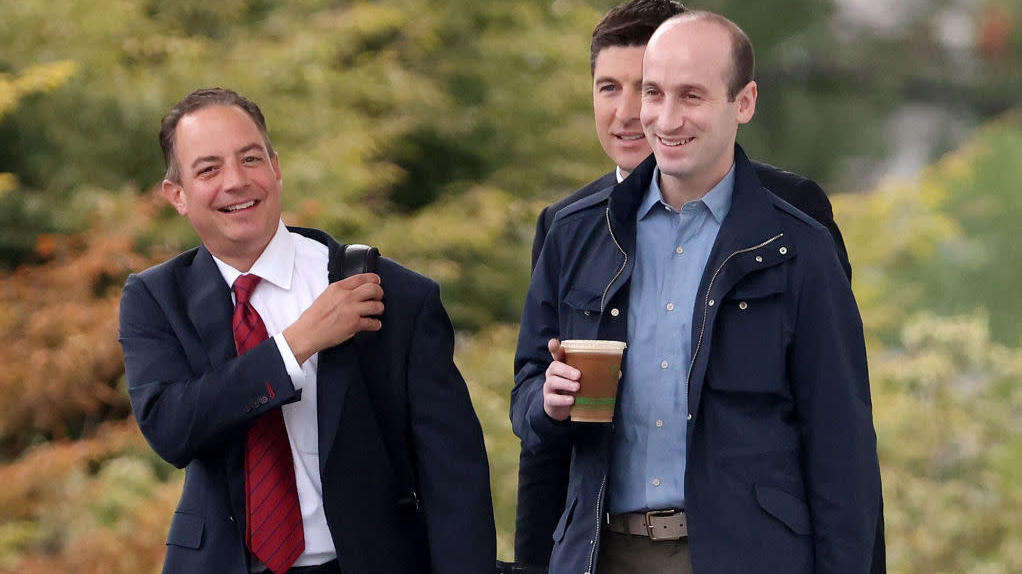You Will Be Unsurprised To Learn That The Trump Administration Was Full Of Lousy Tippers
In case you're wondering, Stephen Miller, former senior policy advisor to Donald Trump, is the kind of restaurant customer who demands to know the provenance of the caviar an upscale D.C. restaurant serves at brunch, then proceeds to order three ounces, and tips 18.5%. "Had Miller left me five bucks on a $500 check," Moe Tkacik, his server for that meal, reflected, "it wouldn't have ranked in the top 10 worst things he had done that day." Still, despite Miller's limitations as a human being, he was still among the best tippers of all the Trump administration officials Tkacik served during the past four years at the upscale seafood restaurant Fiola Mare. Another was Paul Manafort, although he and his family dined under an assumed name.
For the most part, however, Trump administration officials, when they did buck their leader's fondness for well-done steak with ketchup, were lousy tippers. Tkacik's essay for Slate is full of dishy details (sorry) about Trumpers and others who sat their butts down in her section.
Sen. Ted Cruz, for his part, had been an impeccable regular: gracious wife (poor thing), amenable to Sancerre at any price point, takes literally 15 seconds to order, reliable tipper, doesn't make you "work for it." That's how you knew he wasn't a real Trumpist, because the Republicans who followed 45 to town were exhausting, impossible, often stingy, and—because the restaurant was never busy enough anymore to soothe the sting of a bad table with a full section—memorable.
But Democrats could be equally annoying: "[Dianne] Feinstein had the impossible habit of accusing you of forgetting about her drink when you hadn't even finished taking the orders of the other people at her table."
Tkacik, who you may remember from her days at Jezebel (she's now a senior fellow at the American Economic Liberties Project and a self-described "unreformed Bernie Bro"), is interested in more than just spreading gossip, though. Although the staff and management at Fiola Mare had little but contempt for the Trumpers, they still needed to make a living, and so they bent over backwards to serve them, with menu specials so they would come in, and freebies so they would give better tips. The restaurant is still open, so it did work, but at what cost?
Tkacik ends with an anecdote about the January 6 riots. Some of the rioters stopped by a Starbucks to refuel before their march on the capitol. The Starbucks had been closed for eight months but had been reopened to serve out-of-towners who had come to town for the Stop the Steal rally. They refused to wear masks, and they referred to the Ethiopian baristas by using the n-word. Tkacik heard all this from her husband, who was a chef at the hotel where the Starbucks was located:
My husband was almost shaking as he related their stories: He'd been too preoccupied trying to nail down a room service special that might entice the Trumpers to think about the physical threat they might pose to the front lines. Like everyone else in the restaurant industry, we'd all been too desperate for business to turn up our noses at Trumpers, both the Ivy League–educated insiders and the steal-stopping legion.
Feeding people with terrible politics is nothing new in the restaurant industry. Or even terrible personalities and habits. When I worked at Starbucks, for example, a teenage boy would come in regularly to buy 20-ounce cups filled with espresso for his mother. While we pulled the shots, he told us how the caffeine made her verbally abusive, and I felt guilty for enabling her. But we took her money, just like we took the money of the assholes who sexually harassed us and made homophobic comments. (None of these people, it's true, went on to attack the capitol, at least as far as I know.) Because that's good customer service!
Of course this is nothing new, but it's still something to think about if you like puzzling over knotty dilemmas in service and the things you have to do to earn a living. You can find the essay here.
